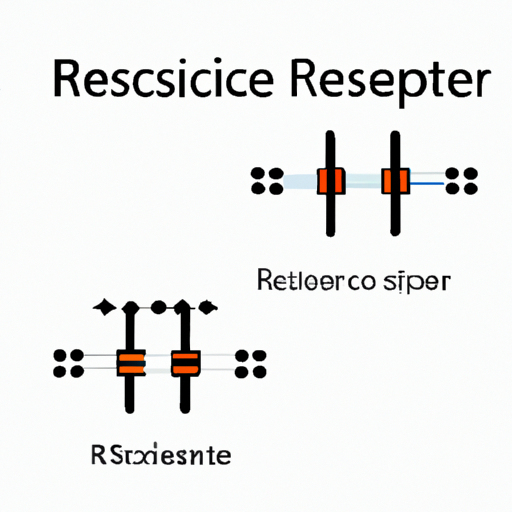

A special resistor, also known as a precision resistor, is a type of resistor that is designed to have very precise and stable resistance values. These resistors are used in applications where accuracy and stability are critical, such as in precision measuring instruments, medical devices, and communication systems.

There are several different types of special resistors, each with its own unique characteristics and uses. Some of the most common types of special resistors include:
1. Precision resistors: Precision resistors are designed to have very tight tolerance levels, typically ranging from 0.1% to 0.01%. These resistors are used in applications where precise resistance values are required, such as in precision measuring instruments and calibration equipment.
2. Temperature-compensated resistors: Temperature-compensated resistors are designed to have a very low temperature coefficient of resistance, meaning that their resistance value remains stable over a wide range of temperatures. These resistors are used in applications where temperature variations can affect the performance of the circuit, such as in automotive electronics and industrial control systems.
3. High-power resistors: High-power resistors are designed to handle large amounts of electrical power without overheating or failing. These resistors are used in applications where high power levels are required, such as in power supplies, motor drives, and industrial equipment.
4. Wirewound resistors: Wirewound resistors are made by winding a resistive wire around a ceramic or fiberglass core. These resistors are known for their high precision and stability, as well as their ability to handle high power levels. Wirewound resistors are used in a wide range of applications, including in audio equipment, power supplies, and industrial machinery.
5. Film resistors: Film resistors are made by depositing a thin film of resistive material onto a ceramic or fiberglass substrate. These resistors are known for their high precision and stability, as well as their low noise and low temperature coefficient. Film resistors are used in a wide range of applications, including in medical devices, communication systems, and aerospace equipment.
In addition to these common types of special resistors, there are also many other specialized resistors available for specific applications. For example, there are resistors designed for high-frequency applications, resistors with built-in surge protection, and resistors with special coatings for harsh environments.
Overall, special resistors play a crucial role in ensuring the accuracy and reliability of electronic circuits in a wide range of applications. Their high level of precision and stability make them essential components in many critical systems, and their advanced design and manufacturing techniques continue to push the boundaries of what is possible in electronic design.
In conclusion, special resistors are a vital component in modern electronics, providing the precision and stability needed for a wide range of applications. Their advanced design and manufacturing techniques make them essential for ensuring the accuracy and reliability of electronic circuits in critical systems. Whether it's in precision measuring instruments, medical devices, or communication systems, special resistors play a crucial role in pushing the boundaries of what is possible in electronic design.
A special resistor, also known as a precision resistor, is a type of resistor that is designed to have very precise and stable resistance values. These resistors are used in applications where accuracy and stability are critical, such as in precision measuring instruments, medical devices, and communication systems.

There are several different types of special resistors, each with its own unique characteristics and uses. Some of the most common types of special resistors include:
1. Precision resistors: Precision resistors are designed to have very tight tolerance levels, typically ranging from 0.1% to 0.01%. These resistors are used in applications where precise resistance values are required, such as in precision measuring instruments and calibration equipment.
2. Temperature-compensated resistors: Temperature-compensated resistors are designed to have a very low temperature coefficient of resistance, meaning that their resistance value remains stable over a wide range of temperatures. These resistors are used in applications where temperature variations can affect the performance of the circuit, such as in automotive electronics and industrial control systems.
3. High-power resistors: High-power resistors are designed to handle large amounts of electrical power without overheating or failing. These resistors are used in applications where high power levels are required, such as in power supplies, motor drives, and industrial equipment.
4. Wirewound resistors: Wirewound resistors are made by winding a resistive wire around a ceramic or fiberglass core. These resistors are known for their high precision and stability, as well as their ability to handle high power levels. Wirewound resistors are used in a wide range of applications, including in audio equipment, power supplies, and industrial machinery.
5. Film resistors: Film resistors are made by depositing a thin film of resistive material onto a ceramic or fiberglass substrate. These resistors are known for their high precision and stability, as well as their low noise and low temperature coefficient. Film resistors are used in a wide range of applications, including in medical devices, communication systems, and aerospace equipment.
In addition to these common types of special resistors, there are also many other specialized resistors available for specific applications. For example, there are resistors designed for high-frequency applications, resistors with built-in surge protection, and resistors with special coatings for harsh environments.
Overall, special resistors play a crucial role in ensuring the accuracy and reliability of electronic circuits in a wide range of applications. Their high level of precision and stability make them essential components in many critical systems, and their advanced design and manufacturing techniques continue to push the boundaries of what is possible in electronic design.
In conclusion, special resistors are a vital component in modern electronics, providing the precision and stability needed for a wide range of applications. Their advanced design and manufacturing techniques make them essential for ensuring the accuracy and reliability of electronic circuits in critical systems. Whether it's in precision measuring instruments, medical devices, or communication systems, special resistors play a crucial role in pushing the boundaries of what is possible in electronic design.